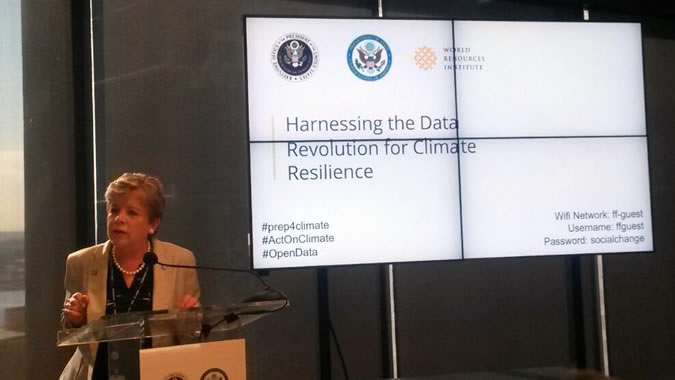Alicia Bárcena Urges for Access to Big Databases to Achieve Climate Resilience and Sustainable Development
At a high-level side event, in the framework of the United Nations General Assembly, ECLAC’s Executive Secretary said that putting this information at the service of the public can bolster adaptation to climate change, saving human lives and avoiding economic losses.

Countries’ access to the public and private big databases produced by the digital revolution is an essential instrument for strengthening climate resilience and developing early warning systems and quick response measures, which could save human lives and avoid economic losses in regions as vulnerable as our own, Alicia Bárcena, Executive Secretary of the Economic Commission for Latin America and the Caribbean (ECLAC), said today.
During her presentation at the high-level event “Harnessing the Data Revolution for Climate Resilience,” which took place on the sidelines of the 71st session of the United Nations General Assembly in New York, Bárcena talked about the growing and vital importance of access to new sources of information and data in formats that facilitate decision-making, mainly in regions that are vulnerable to climate change and natural disasters.
At the meeting—organized by the White House’s Office of Science and Technology Policy, the State Department of the United States and the World Resources Institute—the most senior representative of this regional organization recalled that, paradoxically, Latin America and the Caribbean is experiencing growing vulnerability to climate and natural disasters, but only contributes 9% of the world’s emissions.
“Starting in 1972 with the earthquake in Managua through to 2010, ECLAC coordinated 88 estimation reports on the economic, social and environmental effects and impacts of disasters in 28 of the region’s countries: 71 climate disasters, 13 geophysical disasters, 2 biological and 2 mixed disasters,” said the senior United Nations representative.
Bárcena added that “between 1972 and 2014, the region suffered a total of 2,219 events that caused 520,000 deaths and affected around 230 million people.” With regard to the economic impact, she said, “the cost of all these events in Latin American and Caribbean countries in the 1970-2014 period was approximately $350 billion dollars, as measured in 2014 dollars.”
“How many human lives, how many economic losses could have been avoided if we had had access to all the information compiled over more than four decades,” Bárcena asked.
During her presentation, ECLAC’s Executive Secretary called for putting big databases at the service of the public interest, ensuring key aspects such as privacy, so as to move towards the big environmental push that the 2030 Agenda demands. ECLAC has accumulated a great archive of data and information directly related to climate change, such as the impact on coastal areas, port activity, and the impact on land and marine ecosystems, which is freely accessible.
“The Sustainable Development Goals propel us to change the current development pattern. Investment, fiscal policies, infrastructure, everything should be aligned with a big environmental push,” she stressed.
ECLAC’s Executive Secretary recalled that according to the report The State of Broadband in Latin America and the Caribbean 2016, presented by the organization in mid-September in Costa Rica, 43.4% of all households in the region were connected to the Internet in 2015, although problems remain in terms of quality and equality of access to the Internet.
Finally, Bárcena said that “we are in the age of digitalization, which requires changing the conversation between the public and private sectors in alliance with civil society so that the digital economy, big data, satellite images and georeferencing constitute a set of instruments at the service of policies and strategies for sustainable development and the closing of equality gaps in access to information.”
Related content

Data Revolution for Sustainable Development Requires Investment, Innovation and Leadership
ECLAC Executive Secretary, Alicia Bárcena, was part of the team that prepared a special report on this matter.
Country(ies)
- Latin America and the Caribbean
Contact
Public Information Unit
- prensa@cepal.org
- (56 2) 2210 2040